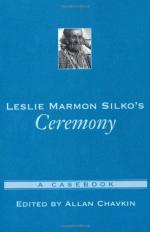|
This section contains 5,253 words (approx. 18 pages at 300 words per page) |

|
SOURCE: “The Dialogic of Silko's Storyteller,” in Narrative Chance: Postmodern Discourse on Native American Indian Literatures, edited by Gerald Vizenor, University of New Mexico Press, 1989, pp. 55–68.
In the essay below, Krupat applies Mikhail Bakhtin's literary theories to Silko's Storyteller as he discusses the roles of authority and voice.
Autobiography as commonly understood in western European and Euro-American culture did not exist as a traditional type of literary expression among the aboriginal peoples of North America. Indeed, none of the conditions of production for autobiography—here I would isolate post-Napoleonic historicism, egocentric individualism and writing as foremost—was typical of Native American cultures.1 To the extent that the life stories, personal histories, memoirs or recollections of Indians did finally come into textual form (traditional Indian literatures were not written but oral), it was as a result of contact with and pressure from Euro-Americans. Until the twentieth century the most...
|
This section contains 5,253 words (approx. 18 pages at 300 words per page) |

|


